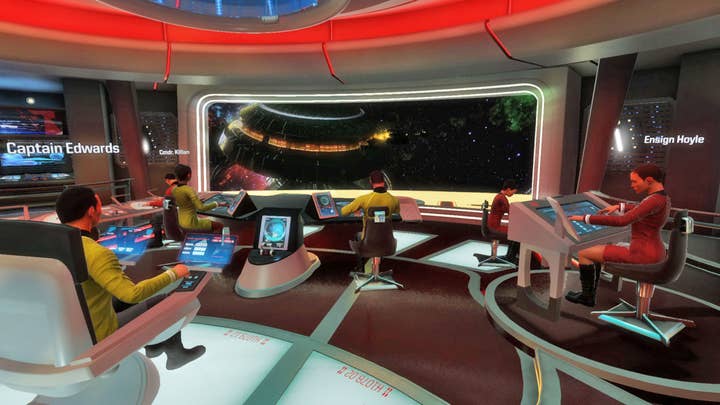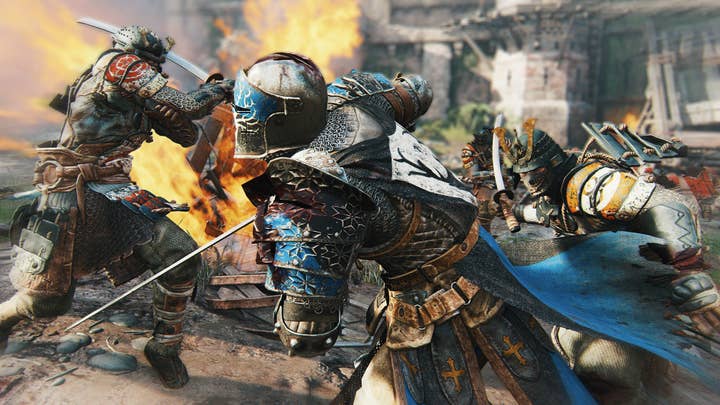Ubisoft: Our VR games will be profitable
Alain Corre, head of EMEA, explains why Ubisoft is betting on VR and talks about eSports aspirations
While 2016 has seen heaps of praise thrown at virtual reality technology, the market itself has yet to be proven. The headsets and PC hardware needed to run high-end VR games are prohibitively expensive, and the installed bases will remain somewhat small because of that. Enthusiasm from developers isn't matched by investors or publishers, but that hasn't scared away Ubisoft from jumping onto the VR train early on.
While Bethesda is pursuing Fallout 4 in VR and Electronic Arts has a Star Wars Battlefront VR experience, the fact is that Ubisoft is the only major third-party publisher that will be releasing several brand-new VR games during 2016. But how can the company justify the investment?
Ubisoft has always supported new technology from the get go (Wii, Kinect, Wii U) and the publisher's head of EMEA, Alain Corre, simply believes the creative possibilities that the new VR technology affords would be too important to pass up.
"For us, when we see VR and the capacity and possibilities of this technology it gives our creative teams new possibilities of expressing themselves and innovating and bringing something fresh, because the immersion you have when you play a VR game is second to none. When you play a good VR game you will never forget it. It will remain in your mind forever. And that's something we were feeling from the beginning when we were presented with the technology. At Ubisoft there are a lot of teams that always want to take a crack at new technology and put their know-how creation into it. That's why we have four games coming this year for VR and we have many more prototypes on the way," Corre tells me at E3.
"...we can imagine that these games will last 2-3 years and will become interesting back catalogue titles for future adopters of VR technology"
"We feel there will be a spark and it will really explode - it's still very early days but we want to put some seeds in the soil and we don't necessarily know which ones will explode and create a new franchise for us. It's an opportunity for us to create new brands," he adds.
Before the year is up Ubisoft will have shipped Eagle Flight, Trackmania Turbo, Werewolves Within and Star Trek: Bridge Crew for the three major VR platforms (Oculus Rift, HTC Vive and PS VR) and the company is betting on the fact that its titles will benefit from early word of mouth among VR enthusiasts. Corre fully admits that it's unlikely Ubisoft will earn back its investments on VR projects in the near future, but he sees a bright future ahead where a game like Star Trek could enjoy healthy catalogue sales for a few years.

"Even with Eagle Flight or with Star Trek VR we think that ultimately during the life of the game that they will be profitable. Because we're very early on... with good quality products they will sell to a certain level based on the installed base within the first year, so there's a limitation but if the games are good they will remain [in the charts]. The first games that come out for a new technology are associated with this technology and it remains in the mind of the people moving forward so we can imagine that these games will last 2-3 years and will become interesting back catalogue titles for future adopters of VR technology," he notes.
I ask Corre how much Ubisoft's VR games cost to build, and while the publisher isn't disclosing budgets, it's clear that a title like Star Trek VR costs far less to build than a AAA blockbuster like Assassin's Creed. That certainly makes it easier to take a risk.
"It's less risky but it's also, at the moment, less rewarding if the game is super successful because there's a limitation in the installed base. But all in all we feel it's important for us to learn and to try to understand what we can do in terms of creation. What are the limits of [VR] and what will the fans enjoy and want and prefer? So we have to invest, not massive amounts of money yet, but on certain franchises and to build new franchises and new gameplay so that we're ready when this market will explode and we believe it will explode at some point," Corre continues.
"We want to keep on growing the community to make sure we keep the energy behind eSports because we believe eSports is super important for Rainbow Six and for the fans to compete together. We're going to invest and expand..."
Another new technology that Ubisoft is excited to support is the Nintendo NX. Of course, Nintendo has yet to say anything at all about its new hardware while the rumor mill continues to present plenty of plausible possibilities, but Corre assures me that Ubisoft is gearing up for a slate of titles beyond Just Dance.
"We announced that we're developing Just Dance for NX and we have other surprises that we will announce later, but we also believe Nintendo has the power to reinvent the way families are playing," Corre tells me. "Nintendo is a fantastic powerhouse of brands that are really cherished by a lot of fans and families... I am still impressed by the reoccurrence of success and appetite even today for the Nintendo franchises on the current system."
NX portfolio aside, Ubisoft is immensely proud of the progress it's made with its own product slate. The publisher continues to create new IP like Watch Dogs, The Division, and Steep while pushing boundaries in its existing franchises.
"I want to emphasize that for Ubisoft one of the unique things is the variety of our portfolio. We were speaking about Steep and Watch Dogs 2 but we also have South Park which is completely unique, coming at the end of the year, and we also are bringing For Honor - the feedback we're getting is very positive, showing that we can excel in different genres," Corre remarks. "For Honor will be a unique game when it comes out. We haven't seen that type of game for many, many years. That's also the beauty of Ubisoft, trying to innovate each time. If I can take the example of Ghost Recon Wildlands, this is the very first time that we will have a military shooter in an open world with co-op and multiplayer... We have to surprise and push the boundaries of creativity so that we can put smiles on the faces of our fans."

For Honor is not only another stab at creating successful new IP, but Ubisoft believes it can become a franchise to allow the company to dive deeper into the eSports market. So far, Ubisoft's biggest eSports presence has been with Rainbow Six, but the team-based nature and co-op gameplay of For Honor lends itself to eSports, Corre believes.
"You need to have the right products to be able to participate in eSports. We have started with Rainbow Six, we have a championship running with Rainbow Six that we signed with ESL. We started with competition on Rainbow Six in January and it's an ongoing set of competition, coming regularly every quarter in America and Europe. We want to keep on growing the community to make sure we keep the energy behind eSports because we believe eSports is super important for Rainbow Six and for the fans to compete together. We're going to invest and expand - it's a long-term franchise moving forward and the fans are very much reacting to any added content we put out. Each time we bring something fresh and new we see the DAU going up like crazy, so it shows us that our fans are there and they want to participate. We expect Rainbow Six momentum and the community to grow in the months and years to come," Corre says.
Because Ubisoft has succeeded in building a stable portfolio of franchises, the publisher finally feels a bit more comfortable breaking up its release schedule. While big games like Assassin's Creed were once guaranteed to ship every single year, that's no longer the case. Indeed, this is the first year in some time that Ubisoft won't be releasing any Assassin's Creed.
"It's important that the fans are happy with what we are producing, and also what we were thinking is that this year we have the movie for Assassin's Creed, so that gives fans the possibility to be in contact with a beloved brand since they can go and see the movie," Corre says. "And the movie is very true to the DNA of the game. It was very important for us to make sure that the DNA of the game was respected in the movie. So we controlled a lot, the script, etc...
"What we want is that our games are perfect when we release them and we are showing that all the time, so we are giving them the time they need to blow away everybody. That's our mission. The beauty of Ubisoft also is to be able to give time to games when we feel they are not completely polished. We are trying to respect the dates of course, but sometimes we have to make the decision to [push a project back], like with The Division for example, which we had to postpone twice because we felt it was not completely polished yet. Quality for us is super important - everyday we work to make sure the worlds we create are as perfect as possible before we release them to the fans because ultimately they decide if the game is good and if they will help with word of mouth."
"We've listened to all the feedback people were sending us after Watch Dogs 1 and we've ticked all the boxes for improving the game"
"This year we have five AAA franchises to come. Watch Dogs 2 is coming and we think that can be a super good game at the end of this year. We've listened to all the feedback people were sending us after Watch Dogs 1 and we've ticked all the boxes for improving the game and making the size of the game twice as big, and the hacking system lets you now hack anybody, all the vehicles and drones and so on. We've also added more multiplayer and co-op. For us, now we can count on all these franchises, which is great because it allows us to let some of our brands breathe," he adds.
While Assassin's Creed "breathes," it's getting the Hollywood treatment, and Ubisoft has already made it clear that it expects Watch Dogs to become a major movie IP as well. Can we expect Ubisoft to leverage even more of its brands in Hollywood?
"Well it needs to make sense," Corre says. "We are a video game company and we have the chance to have many fans of our franchises and that's our core business - we really want to protect the DNA of our brands. With Assassin's Creed we've waited many, many years before being able to green light this movie because we were not happy with the way this franchise would have been treated. Because we've been able to have our influence into the script, the story, the actors, so we became comfortable that an Assassin's Creed fan going to see the movie would feel at home and it's a new experience for the fan but it's in line with the values of the brand.
"With Watch Dogs it's exactly the same way - we want the movie to respect the values of the video game brand; it takes more time because you have to rewrite the script and so on but it's necessary for us to protect our IPs. It all starts with the video game - if we can find some opportunities in other entertainment worlds to create something new and to permit a certain number of new persons to enjoy our worlds and to one day also buy a video game that would be good. It's on a case by case basis, though."

